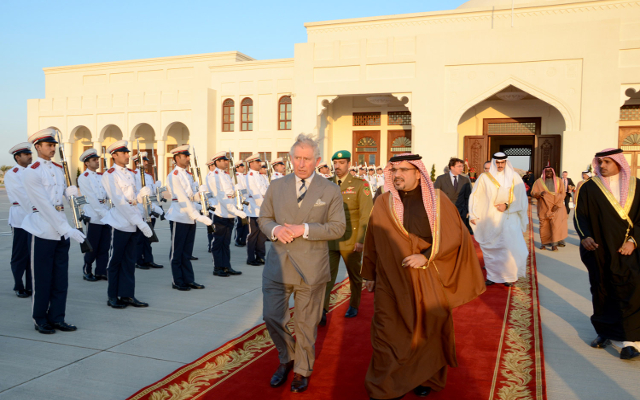On 1 November 2016, Americans for Democracy & Human Rights in Bahrain (ADHRB) sent a letter to Prince Charles regarding his upcoming official country visit to Bahrain. The text of the letter is as follows:
Your Royal Highness,
In November, you will be taking part in an official country visit to the Kingdom of Bahrain for a commemoration recognizing the 200th anniversary of the first formal agreements between the United Kingdom and Bahrain. Given the heightened human rights crisis in the kingdom, Americans for Democracy & Human Rights in Bahrain (ADHRB) calls on you to underscore the need for meaningful human rights reforms in the kingdom during your upcoming trip. We believe your visit represents an opportunity to engage in pointed dialogue with Bahraini officials to advance international standards of human rights.
In 2011, the Government of Bahrain enacted a violent repression of a popular pro-democratic movement that called for governmental reforms that would guarantee citizens basic rights. In response to the peaceful call for reform, the government violently shut down the movement and imprisoned thousands for their activism. Since that time, King Hamad bin Isa Al Khalifa has promised to implement reforms that would institutionalize human rights in the country. Yet since 2011, the Bahraini government has only moved to institutionalize additional means of repression and abuse.
Over the past several months, the government has increasingly restricted both civil society and political space in the country. This summer saw the arrest of human rights defender and Bahrain Center for Human Rights (BCHR) president Nabeel Rajab. The Government of Bahrain has repeatedly targeted Rajab, subjecting him to numerous stints in prison on charges related to his work on human rights and freedom of expression. Most recently, Bahraini authorities arrested and charged Rajab for posts on social media. Rajab could face up to 15 years in prison for tweets.
That same month, the Bahraini government dissolved the largest political opposition society in the country, al-Wefaq. Prior to the dissolution of the political society, the Bahraini government arrested the Secretary-General of al-Wefaq Sheikh Ali Salman in December 2015. The closure of the leading opposition society represents an unprecedented move to close off peaceful public avenues for Bahrainis to address their grievances and participate in the democratic process. Since the closure of al-Wefaq, Bahraini allies have noted that the closure was “not consistent with a commitment to… pursuing unfulfilled reforms” and urged the Government of Bahrain to allow for the society to operate freely.
The practices of arbitrary arrests, detentions, and denaturalizations have also expanded over the past year and a half. The Government of Bahrain has targeted a number of independent journalists and online activists, effectively silencing free press in the country. Additionally, authorities continue to arrest people for their online social media use. These individuals are often detained in the same prisons with those who have committed violent criminal offenses, while their trials are repeatedly delayed, unduly extending individuals’ pre-trial detention before facing a final verdict. Additionally, the government has denaturalized more than 350 individuals, many of whom are human rights activists, academics, journalists, political opposition figures or Shia religious clerics.
Human rights organizations have found that the widespread and systematic use of torture in the country continues with impunity, despite promises from Bahraini authorities to institute reforms. ADHRB and BCHR have documented more than 350 cases where Bahraini authorities have tortured individuals since 2013. When victims of torture attempt to file a formal complaint with government institutions, they have been subject to reprisal and, in some cases, further torture. If torture has been used to extract a coerced confession and the victim attempts to address the abuse in court, judges will often refuse to recognize the complaint and threaten to send the victim back to their cell. Since 2011, the UN Special Rapporteur on torture has requested a visit to the country to investigate the authorities’ practice of torture; the government has yet to allow him into the country.
Your trip to Bahrain presents an opportunity for you to leverage the United Kingdom’s historical alliance with the gulf kingdom and encourage a key regional partner to address its heightening human rights crisis. When meeting with authorities, we urge you to call for the release of human rights defender Nabeel Rajab and all prisoners of conscience in Bahrain. Additionally, we ask that you underscore the importance of political pluralism in Bahrain, and press the government to restore suspended political associations, like Al-Wefaq. It is our sincere hope that with the support and encouragement of its close allies, Bahrain will chose to abandon their path towards deepening repression in favor of universal human rights.
Sincerely,
Husain Abdulla
Executive Director
Americans for Democracy & Human Rights (ADHRB)
To download the letter as a PDF, please click here.





